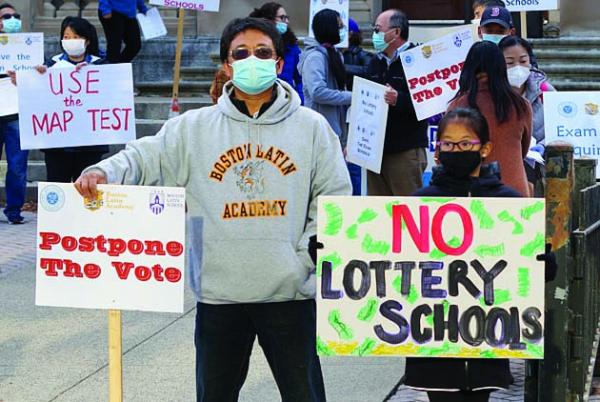October 21, 2020

Opponents to a plan to cancel the exam for BPS school placements this year protested outside of Boston Latin School on Oct. 17. Adam Gaffin/Universal Hub photo
A controversial proposal to discontinue the exam used to place students into Boston Latin School, Boston Latin Academy, and the John D. O’Bryant School of Mathematics and Science for the upcoming academic year was scheduled to be voted on by the School Committee on Wednesday after the Reporter’s deadlines.
The plan, developed by BPS Superintendent Brenda Cassellius and a working group commissioned by the district earlier this year, has drawn both support and a backlash over the past week.
Instead of using exam results, the district wants instead to draw up a pool of eligible students who either maintained a B average this academic year or who “met or exceeded expectations” on the 2019 MCAS test. The district would then distribute invitations to students based on prior report card grades and zip codes.
Up to 20 percent of the seats available next year would be reserved for students with the top grades in the city. The remaining 80 percent would be admitted to the schools based on their GPA ranking within their home ZIP code, with eligible students from the lowest-income ZIP codes given first choice.
The students’ schools would need to certify that they are learning at grade level under the state’s curriculum frameworks to be judged eligible. If the committee okays the proposal, there will be a 15 percent increase in the number of seats apportioned to Black and Latinx students, the plan projects.
The district would then begin identifying qualified students for the applicant pool in November and December.
Reaction to the proposition was both swift and direct.
Last Saturday, a group of about 70 parents gathered outside of The Latin School to rally in favor of keeping the exam, while those in opposition to that approach held a counter-protest across the street.
Exam proponents pressed for a public hearing on the issue before the School Committee took a vote. On the other side of the street, people holding signs pointed to the fact that Boston Latin School in particular has demographics nowhere near those of the rest of the BPS district.
District 3 Councillor Frank Baker said cancelling the exam this year makes sense given the pandemic, but, he added, “I’m in the camp of thinking we should be having some sort of test, maybe the hybrid between going to different zip codes but making sure that they’re still having a test. I think it should be an exam paired with other things.”
District 4 Councillor Andrea Campbell, who is running for mayor in 2021, said it would be “irresponsible” to hold the exam this year. “This plan doesn’t change the admissions process permanently, but it has the potential to create more equity in the admissions process next year, which we should all welcome,” she said, adding, “As a Latin School graduate, I know personally how important this process is to students and families, and they deserve clarity.
“It’s a failure of the mayor and the district not to have created a process around this decision where parents, students, and families feel included and could make their voices heard,” Campbell said in a statement.
At-Large Councillor Annissa Essaibi George thinks there should have been a public comment period included in the process to create a new plan. “I am disappointed that the School Committee vote is taking place before an opportunity for public comment from parents and school communities,” she said in a statement.
“As chair of Education,” she added, “my top priority is making sure the process is fair and that every child has an equal shot at being admitted to an exam school from the moment they enter our school system. And the unfortunate reality is that we cannot provide an equal and fair process until we have high quality schools in every neighborhood.”
At-large Councillor Julia Mejia said that she “didn’t even know exam schools existed” when she graduated from Dorchester High School and that she favors “reimagining” the exam school selection process.
“If Covid is presenting itself as an opportunity for us to reimagine what this process looks like, then I welcome that opportunity to dive into that conversation and utilize this moment to figure out how we can make it more equitable,” she told the Reporter in a phone call.
Data show that 72.4 percent of BPS students were Black or Latino last year, compared to just 21 percent at Boston Latin Academy.
Quality Education for Every Student (QUEST), a grassroots organization of BPS parents, announced its support of the working group’s recommendation this week.
“Schools and universities around the country have recognized that basing admissions on tests is neither safe nor equitable during the COVID-19 pandemic,” the group stated. “While we are pleased with the intent and projected outcome of this proposed temporary change, we cannot escape the reality that a small number of selective admissions high schools still offer the promise of more opportunity and resources in comparison to our open-enrollment schools.”


